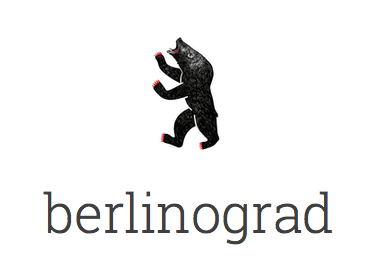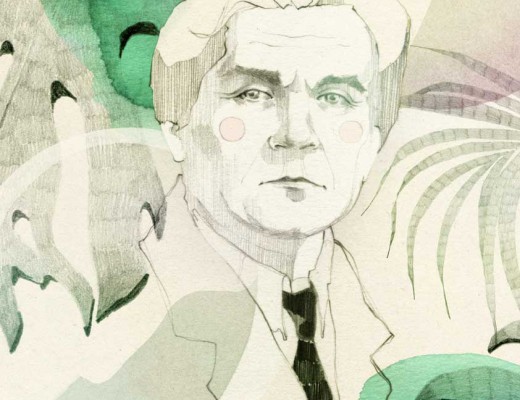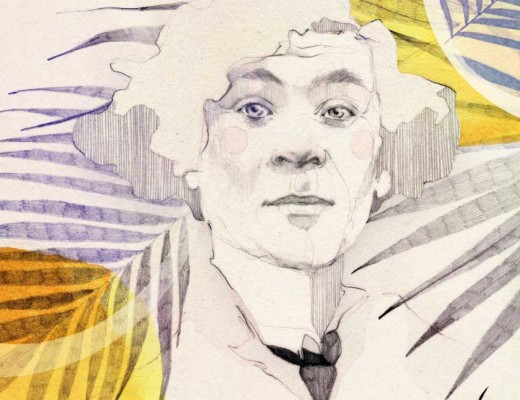Gala, first named Elena Diakonova, was born in the Russian Empire and moved to Switzerland at an early age then later to Paris, where she married the young poet Paul Éluard. She was a feminist of the highest order. She viewed herself simultaneously as a feisty woman but also a muse who could be called upon to serve an artist on the path to absolute success, thereby gaining fame and immortality herself. Gala is undisputedly an important figure of the Avantgarde, although she is not an artist herself. As a muse, however, she had an enormous influence on all artists having entered her life, including Max Ernst, whom she left because of not being ambitious enough. Finally, Gala reached the art’s Olympus through Salvador Dali as she experiences eternity beyond all time through his painting.
Her dream finally came true with Salvador Dali, whose obsession she went on to become. But before meeting Dali, she followed many different pleasures. One of her pleasures was the young German painter Max Ernst, whom she met with Paul Éluard in Cologne. One day Max moved to Paris where he was invited to live with Gala and Paul in a ménage à trois for some time, which Paul reluctantly endured.
Gala and I have known each other for some time; I often invited her to Berlin. When she finally accepted the invitation, we were both delighted. We spent some enjoyable days together, lastly meeting in a bar, a dark and stuffy full of smoke. The misted window facade and the turmoil in the bar gave the appearance of a shadow play from outside. The few tables were already occupied, so we took place at the bar. Gala ordered a Soul Elena and me a Jack Rose.
Gala:
You look beautiful.
Ani:
Oh, my dearest friend, thank you, you look beautiful too.
G:
We had such a wonderful time here, I am a little bit afraid of going back to Paris. These me. What should I do?
A:
I am sure, you will find a way (smiles). It can be challenging to live only with one man, but tell me, how is life with two men at the same time?
G:
They bore me both. I must permanently tell them to be productive. I am very passionate and devoted towards their art, but I expect them to do excellent work. What I see is unworthy of me.
A:
What about art in general and especially in Paris? How is the relationship between art and the artist supposed to be?
G:
All I can say is, there must be a necessary interaction between art and the artist. This is at least what I think. They cannot face the world and serve each other as medium and as a career of ideas without the bond of one and other. But what cannot waive both is an inspiration, which always comes as a third component. You see, I am the muse. They do art because I inspire them to do art and because I exist in their lives. I dictate their unconscious minds what to bring on paper or canvas.
A:
Your nature is very determined in contradiction to either Paul or Max. Why don’t you move to Berlin where we have so many artists you could drive completely mad?
G:
You are more faithful to my beloved than me… I am still lenient (smiles). Could this be possible? Berlin only holds the perfect possibility to begin a life as an artist, when you aim to reach for the art’s Olympus, you must be in Paris. On the other hand, I only want to be free and to be eternal. In Berlin, you are always in search of something.
A:
You surprise me.
G:
Why should I?
A:
Berlin is a catalyst. I did not expect you to be looking for something. I perceive a touch of indecision.
G:
You are wrong. I am not indecisive, I know there is something more waiting for me and I know intuitively how to get there.
A:
What do Paul and Max think about your ambitions?
G:
I wish they had an opinion. At least I am not familiar with such a state.
A:
Sometimes you seem unconcerned when you talk.
G:
We know each other for such a long time, and you think I am unconcerned?
A:
Yes.
G:
Why?
A:
I cannot explain precisely, but it is how I feel sometimes feel when I listen to you.
G:
My dearest friend, I am everything apart from “unconcerned”. I know which path to take, and I don’t want to get held back by anyone or anything, this is all.
A:
Then please explain, what do the people who you surround yourself with mean to you?
G:
They exist to serve art. So, do I, as a muse.
A:
Is the art truly of highest importance?
G:
I know you very well, and I know that you only want to provoke me with such questions, and I know which your answer you seek: Art is the air I breathe, I don’t want to be without art for there is no human existence without art.
A:
How did you become a muse?
G:
That was not my personal decision, I woke up one perfect morning as a muse.
A:
How you manage your influence on men?
G:
The truth is more straightforward than it seems: Men must obey women. The world men created is coming out of joint. They are destructive, undisciplined, hedonistic and spoiled. This is what I think at the moment. They do not, and they cannot create without an initial spark. Creating is an important ability, it is first assigned to women. They give birth to a new life like a muse lights an artist’s soul which gives birth to art.
A:
What do you expect as a muse?
G:
I only expect obedience and diligence towards art. I am the muse and the mistress. An artist is inseparable from his muse and suffers without her. It is a divine moment when an artist meets his muse. So, he must feel pushed to art and to be productive, what on the other hand is the energy that explains an artist’s obsession with his muse.
A:
What is the influence of that obsession on everyday life?
G:
When I am not around they stop being productive, which I absolutely cannot stand. They first associate art with me as their muse, and then with their talent.
A:
Don’t you feel imprisoned?
G:
No, I don’t. This situation does not determine my everyday life, but their lives. I am free, and I need to be free.
A:
Why do you think to have the power to influence an artist’s life?
G:
I don’t indulge that thought and just try to follow my intuition. The reason why I dominate is to prevent being dominated.
A:
Don’t you feel pity towards them?
G:
Stop asking me such things! Why should I feel pity?
A:
I am trying to understand you. I think men and women suffer unimaginably under dominance and life fully becomes a woe. From that point on, it is not a question of behaviour towards women or men anymore, but of awareness of human beings.
G:
Your point of view implicates an intention to hurt somebody, which is not true.
A:
I only want you to be mindful of the consequences of your behaviour.
G:
In Russia, we have the adage, that one does the loving, and the other one gives in to love.
A:
Max told me that the moment you leave him, he will die.
G:
I will leave when I am not satisfied with his work. And when I leave, I take everything.
A:
Gala, you are a sadist. I don’t know any woman like you.
G:
Paul and Max should keep me happy with art, this is the only claim I make. If they cannot bear it, then perhaps are not the right artists for me. A sadist…how do you suppose I experience the moments when they confront me with something, which is not art? It is a burden. Art must be radical.
A:
In that case, what is your definition of art?
G:
Devotion, faithfulness, love, obedience and faith. These elements must be equally present in a muse-artist relationship for beauty to be created, which is art. I would like to know how you define beauty?
A:
Dearest, I think beauty is what causes an immediate desire, and it is what you want to own.
G:
But then it should also mean that beauty is a matter of taste. I think it is wrong. Beauty does not exist because someone thinks something is beautiful, but because beauty follows the rules of infinity, which we cannot put into words. If a blind man cannot recognize beauty because he lacks physically the capacity to do so, does beauty stop being beautiful?
A:
I think, no. Are you beautiful?
G:
I am as beautiful as any other human being can be. It is not up to my personal decision, time will tell. I follow Master Dostoyevsky: “Beauty will save the world”. This is what I want to believe and what is my religion.
The conversation took place in Russian at Strelka bar at Wittenbergplatz, an ark for many artists. It was a cold, rainy Berlin Thursday evening towards the end of January 1924.





No Comments